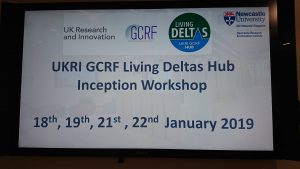In this Lug piece, Siobhan Warrington introduces the Living Deltas Hub and provides an update on how the Newcastle Oral History Unit & Collective is contributing to this large, five-year (2019-2024) international and interdisciplinary project.
Continue readingTag Archives: research
Oral history and the current Covid-19 crisis
In this statement on behalf of the Oral History Collective, Graham Smith, Professor of Oral History at Newcastle outlines some of the challenges and possible responses that oral historians face during the COVID-19 crisis. He argues that oral historians need to go beyond the technical challenges of remote working and think about the political crisis arising from the COVID-19 pandemic. In doing so, he warns against oral historians supporting stereotypical and dangerous attitudes to older people, and outlines the Collective’s local and international strategy.
Graham would like to thank Oral History Unit colleagues for their early input and Collective members who commented on the draft. Graham notes: ‘Any errors or mistakes are his alone’.
Continue readingFunded PhD opportunity: Oral History’s Design: A creative collaboration.
Sustaining visitor (re)use of oral histories on heritage sites: The National Trust’s Seaton Delaval Hall AS A case study.
Oral history’s popularity as an active collecting method and archiving tool have outstripped the level of reuse of oral histories in historical interpretation. And while oral history’s limited reuse of archived oral histories has attracted some interest, this is based mainly on proposed digital technical fixes. Significantly, there is relatively less research on the dissemination of oral histories and their reception by audiences. Oral history as an emerging discipline has yet to adequately integrate users and audiences into the processes of analysis and reuse.
Continue readingOral History in crisis? Casualisation, deskilling and precarity in our field
In this post, Andy Clark reflects on discussions originating from the 2019 Oral History Society Conference held in Swansea regarding the current state of oral history. In particular, he reflects on the casualisation* and precarity faced by practitioners of the methodology. How can we develop an approach that is inclusive, democratising, whilst also promoting the skill-set of trained and experienced oral historians? Please feel free to join the discussion by posting in the comments section below.
Deindustrialisation, heritage and memory: Reflections on 2018-2019 network
Deindustrialisation, and the understanding of how it continues to reverberate through working-class communities, is a relatively new but growing interdisciplinary field. Alongside academic interest, community activist groups, heritage organisations, trade unions and artists are engaged in examining the impact of structural economic change. The Deindustrialisation, Heritage and Memory Network came together through three workshops – held in Glasgow, Newcastle and Canterbury – which brought together research from across academia and the heritage sector, offering an important space where significant and lasting connections have been made. In this post, network contributors Paul Barnsley and Emma Copestake reflect on their experiences of the workshops, and consider future directions in the field.
From reflective to prospective practice: an oral history of the Lockerbie disaster, 1988
Last year, Dr Andy Clark was awarded a British Academy / Leverhulme Trust Small Grant to conduct a scoping project on the Lockerbie disaster, 1988. Working with Dr Colin Atkinson, Lecturer in Criminology at UWS, they will conduct interviews with a number of witnesses involved in the aftermath of the disaster. In this Lug post, Andy reflects on how to prepare for such a project. There is an extensive literature on reflections of oral historians once projects have been completed, but in this piece, Andy discusses his thoughts and approaches before beginning the interview process. Continue reading
Foodbank Histories: Placement Reflection by Jack Hepworth
Foodbank Histories is a collaborative project between Newcastle West End Foodbank, Northern Cultural Projects, and Newcastle University Oral History Unit & Collective. The project began in 2018, recording approximately 30 short oral history interviews with foodbank clients, volunteers, and supporters. Over the past five weeks, PhD candidate Jack Hepworth has completed a short-term placement on Foodbank Histories, funded by the Newcastle University Social Justice Fund. Here he reflects on his experience.
Living Deltas Hub: UKRI and GCRF
The Oral History Collective is delighted to be associated with the UK Research and Innovation (UKRI) Global Challenges Research Fund (GCRF) Living Deltas Hub. As part of a large, multi-disciplinary team, Professor Graham Smith and head of Newcastle University’s School of History, Professor Helen Berry, will lead a team of Research Associates a nd collaborative partners in history and oral history that will explore popular memories of environmental change across three of the world’s major delta regions. Here Graham reflects on just why the project is so exciting.
nd collaborative partners in history and oral history that will explore popular memories of environmental change across three of the world’s major delta regions. Here Graham reflects on just why the project is so exciting.
Children under the Nazis: Exhibition, Education, and Website
What was it like to be a child during Nazi rule, and what have children said about their experiences? These are the central questions driving Dr Beate Müller’s impact and engagement project on ‘Children under the Nazis’. Continue reading
Community Experiences of Serious Organised Crime in Scotland
In this Lug post, Andy Clark discusses his experience conducting research for the Scottish Government’s Cabinet Secretary for Justice. Along with a team of researchers, he contributed to, and co-authored, a major report focused on community experiences of Serious Organised Crime in Scotland. He reflects on utilising oral history methods to examine current experiences and problems in relation to organised crime, and contributing to a policy report.
